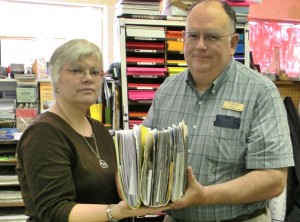By Michael Howell
The Hamilton City Council took a stand in support of their downtown businesses and against Big Box store development last week, approving a proclamation that opposes the construction of large-scale retail facilities in the Hamilton Trade Area. That trade area is defined in the City’s Hamilton Downtown Master Plan as including the valley floor and the foothills east and west of the Highway 93 corridor, “basically from Florence to just south of Sula” and containing a population in 2013 of about 33,479 residents. A large-scale retail facility is described in the proclamation as one having equal to or greater than 60,000 square feet. The proclamation comes in response to a recent wastewater discharge permit application made by local realtor Lee Foss which would serve a 156,159 square foot retail store located south of the city limits on Blood Lane and Highway 93.
In the public comment period of the meeting, Terry Marasco told the Council that, after reading a thousand or so pages on the subject, he believed that at least two things were going to happen if the proposed big box store was built: greater unemployment and lower wages for those who are employed.
Russ Lawrence, coordinator for the Hamilton Downtown Association, said that group “formally and enthusiastically supports the Proclamation.”
“As you know,” said Lawrence, this kind of development has very negative environmental, social and economic consequences.” Those consequences include depressed wages, urban sprawl, light and noise pollution, increased traffic problems and depressed commercial property values in Hamilton. He said this would force the City to raise taxes to make up the difference and place new demands on the City’s services at the same time.
“The worst effect, to me,” he said, “is the effect on the social fabric of the community as a whole.” He said as more and more money leaves the valley, support for community non-profits declines. He said it is these non-profits and community organizations that define the community.
Another speaker said that the state’s constitutional obligations and the cumulative effects of such development are not being addressed as the Department of Environmental Quality is only looking at a wastewater system and not the whole development.
Another speaker said that his heart was here, he wanted to live here but it was difficult to survive here already economically.
“If we don’t think it will affect us now, we are being naïve,” he said. “We’ve got to protect what we have for our neighbors, for our friends, for ourselves and for our kids.”
Clover Quinn, who is circulating a countywide petition in opposition to big box stores, also expressed support for the proclamation.
“It makes you feel so helpless,” she said, “that someone in Helena, with the swipe of a pen, can destroy the kind of lifestyle that we have in this community with no regard for our livelihoods or our quality of life.” She said she had done a lot of studying about the issue and, “the more I look into it, the more I am appalled. We have to make a stand for this town and this community.”
Terry Marasco spoke again, saying he had gotten some response from a Freedom of Information Act request to DEQ that, in his perspective, shows “collusion amongst DEQ, the consultants and Mr. Foss.” He said by keeping the true identity of the retail store developer a secret the deal leaves a local realtor with responsibility for the long term maintenance and operation of the wastewater system. He said it was irresponsible for DEQ to place that responsibility with a realtor who couldn’t possibly handle such a task or be held financially responsible for any failure.
Mayor Jerry Steele noted before any Council discussion that the proclamation was “not intended to become law or have any regulatory effect.”
Councilor and downtown business owner Al Mitchell said that the proclamation concerns the economic influence and the degradation of quality of life as it relates to the City of Hamilton and its citizens caused by a large scale retail facility being built in the Hamilton Trade Area.
“By supporting this proclamation, we are not stifling business, but merely attempting to avoid economic domination by a multinational retail giant.” He said that literature suggests that for every job created by such developments, 1.6 jobs will be lost.
“Business in the Hamilton area is in a fragile economic state,” he said. “The area has not yet recovered from the Great Recession and internet buying has impacted not only retail, but in fact, all businesses including insurance, real estate and banking.” He said that large scale retail facilities will lead to business closures and bankruptcies at the city core, which could lead to decreased property values and eventual blight in the affected areas.
Mitchell said that the elimination of small businesses could have an enormous negative impact on local non-profit organizations that depend on contributions from small businesses for their existence. He held up a huge file of papers, saying, “This file is filled with thank you letters from schools, scouts, nonprofits, and others over the last several years. This represents only the folks who sent thank you notes. Imagine the impact of the elimination of ten, fifteen, twenty or more small stores in the area.”
“It’s too bad that it’s come to this,” said Council President Jenny West. She said the City was working as hard as it could to protect the quality of life in the community but that it has no power outside of town.
“It’s unfortunate that the county has never come up with a Big Box ordinance,” she said.
The Council voted unanimously in support of the proclamation. Councilor Ken Bell was absent.